Add OIDC single sign-on to any website with HAProxy and Keycloak
- Run the unprotected service
- Reminder how OIDC works
- Creating our client
- Manual token fetch with CURL
- Redirect to get tokens if there's no session cookie
- Implement the token fetch
- Store the tokens in a map and set the session cookie
- How to troubleshoot an HAProxy configuration
- Validate the received tokens
- Use profile information in the application
- The complete implementation
- How could the implementation be improved?
- Conclusion
Given a simple web application that is unaware of authentication, it's possible to wrap a single sign-on implementation around it to require authentication using only Keycloak and HAProxy.
Why Keycloak?
Most full-featured identity providers are cloud-based from the large vendors: Okta, OneLogin, AWS, others. The only self-hosted alternative I'm aware of is Ory Hydra which I admittedly haven't tried.
While applications and databases can be migrated to different platforms fairly easily, it's very difficult to migrate your user store to some other product. The vendors may not provide tooling since don't want you to leave, and they probably won't support moving user passwords. This makes the migration high-risk and disruptive for users. For these reasons I advocate self-hosting your IdP, even if the rest of your stack is cloud-native.
Keycloak is also surprisingly good. It does everything including authentication (single sign-on, OIDC) and authorization (OAuth) with a state-of-the-art feature set that I can host myself with no cloud dependencies.
Why HAProxy?
I've been levelling up my HAProxy skills and am always impressed at how good is. I explore a number of new-to-me features in this article.
I suspected that I could take a standalone website and put HAProxy in front of it to require OIDC authentiction.
There are other ways to wrap an application with OIDC like Dex. Using HAProxy was attractive since I'm already running it in a general CDN/WAF way so using it also for OIDC doesn't add a new dependecy to my stack.
It's all running locally. Keycloak is started with the local dev settings:
erik@carbon ~/tmp/keycloak/keycloak-20.0.1 $ ./bin/kc.sh start-dev 2022-12-22 12:56:22,312 INFO [org.keycloak.quarkus.runtime.hostname.DefaultHostnameProvider] (main) Hostname settings: Base URL: <unset>, Hostname: <request>, Strict HTTPS: false, Path: <request>, Strict BackChannel: false, Admin URL: <unset>, Admin: <request>, Port: -1, Proxied: false 2022-12-22 12:56:23,257 WARN [io.quarkus.agroal.runtime.DataSources] (main) Datasource <default> enables XA but transaction recovery is not enabled. Please enable transaction recovery by setting quarkus.transaction-manager.enable-recovery=true, otherwise data may be lost if the application is terminated abruptly 2022-12-22 12:56:23,883 WARN [org.infinispan.CONFIG] (keycloak-cache-init) ISPN000569: Unable to persist Infinispan internal caches as no global state enabled 2022-12-22 12:56:23,897 WARN [org.infinispan.PERSISTENCE] (keycloak-cache-init) ISPN000554: jboss-marshalling is deprecated and planned for removal ...
... with a realm "myrealm" and user "myuser" created as per the Get Started guide for bare metal.
The app I'm protecting is the magic8ball example of an HAProxy service. It's not even an application but an HAProxy service which is a small application that runs in the HAProxy process as a Lua script. This code is here.
Run the unprotected service
magic8ball.lua:
local function magic8ball(applet)
local responses = {"Reply hazy", "Yes - definitely", "Don't count on it", "Outlook good", "Very doubtful"}
local myrandom = math.random(1, #responses)
local response = string.[[
<html>
<body>
<div>responses[myrandom]</div>
</body>
</html>
]]
applet:set_status(200)
applet:add_header("content-length", string.8)
applet:add_header("content-type", "text/html")
applet:start_response()
applet:send(response)
end
core.register_service("magic8ball", "http", magic8ball)
This is largely pasted in from the guide linked above.
haproxy.cfg
global # service: the target application lua-load magic8ball.lua defaults mode http timeout connect 10s timeout client 1m timeout server 1m frontend fe_main bind :8891 # regular resource default_backend resource backend resource # pass legit traffic to application http-request use-service lua.magic8ball
This is a boilerplate configuration. Notice the load-lua and use-service directives which wire in our magic 8 ball service.
Now start HAProxy:
erik@carbon ~/tmp/magic8ball $ haproxy -d -f haproxy.cfg Note: setting global.maxconn to 262126. Available polling systems : epoll : pref=300, test result OK poll : pref=200, test result OK select : pref=150, test result FAILED Total: 3 (2 usable), will use epoll. Available filters : [BWLIM] bwlim-in [BWLIM] bwlim-out [CACHE] cache [COMP] compression [FCGI] fcgi-app [SPOE] spoe [TRACE] trace Using epoll() as the polling mechanism. ...
The -d flag enables debugging and running in the foreground.
Now the service loads:

We have a trivial service to protect.
Neat that HAProxy provides the capability to run a service. It has other useful hooks like actions, which we'll see in a minute. This makes all kinds of edge computing possible.
Reminder how OIDC works
Tokens (JWTs) are the core of OAuth/OIDC. With some browser redirects and some server-side requests, HAProxy gets a hold of the tokens specific to 'myuser':
- The ID token is for our magic8ball application (the OAuth client) to use. It tells us the user is authenticated and has some profile information like the user's full name, etc. Importantly, it doesn't tell us what the user is authorized to do in the applicaiton.
- The access token is for authorization. We ignore it here because we're not providing authorization and because our client isn't the consumer ("audience") of this token.
- The refresh token lets us get replacement ID and access tokens, allowing the user to remain logged in indefinitely but still securely.
Our main task is to redirect the user to the Keycloak signin page, which will redirect us back to our applicaiton with an authorization code. HAProxy will make a server-side request to get the tokens and store them for the user (keyed to a session ID). Then subsequent requests to the application will check that there's a valid, current ID token for the session so the user is authenticated.
Creating our client
Create a client "magic8ball" in the "myrealm" Keycloak realm:
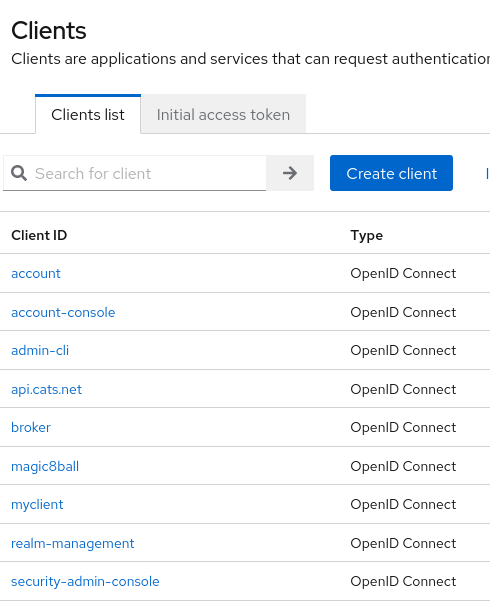
This client corresponds to our magic8ball application. Most settings can be left at defaults. Some important ones:
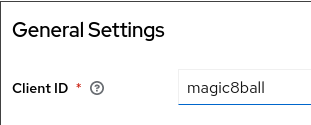
The client ID can be any string so "magic8ball" is clear enough.
Add the /code URI to Valid Redirect URIs:
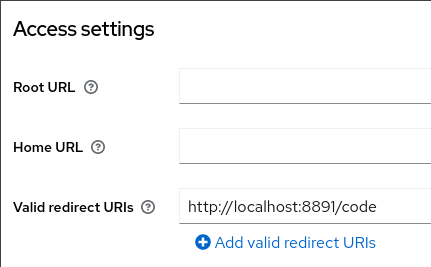
This is an allowlist for where the user can be redircted to after sign-in with the authorization code.
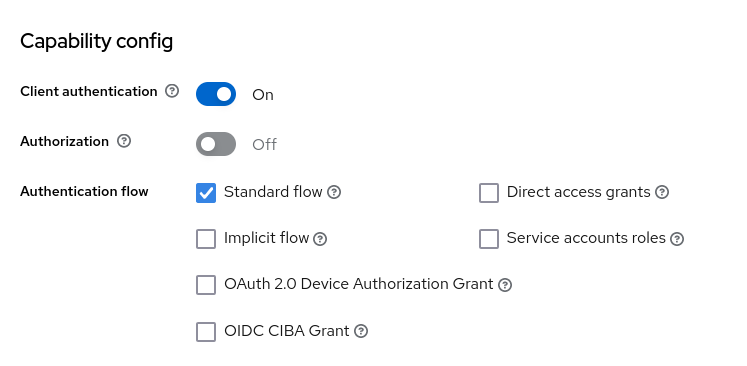
The standard flow is all we require for this implementation.
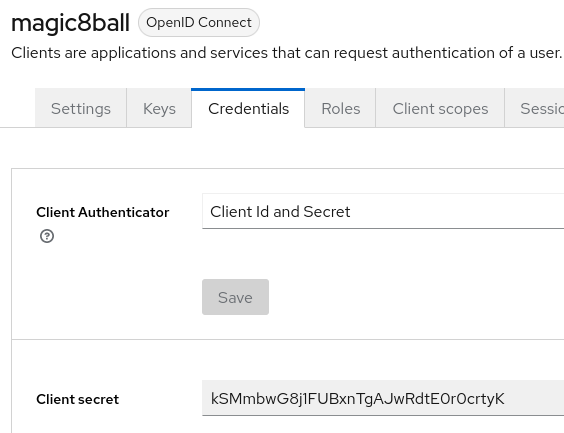
The client secret has been generated for us. Note its location since we'll need it to fetch the tokens.
Manual token fetch with cURL
This isn't strictly necessary but It's good to check with cURL that we can fetch and inspect the tokens. Then if we get some error later while integrating it into our application we'll have eliminated some variables.
Prepare the basic auth credential. It's base64(clientid:clientsecret). When preparing it like I do here, be careful to press Ctrl+D twice, don't press Enter (so no newline is encoded).


Capture the resulting value (starts with 'bWF' in this example).
Prepare this URL. This is where your application will redirect the browser to in Keycloak for sign-in.
http://localhost:8080/realms/myrealm/protocol/openid-connect/auth?scope=openid&response_type=code&client_id=magic8ball&redirect_uri=http://localhost:8891/code
- Note some values
- /realms/myrealm ... our realm
- scope=openid ... generally always required to get an ID token
- response_type=code ... says we want an authentication code
- client_id=magic8ball ... matches the client ID we set
- redirect_uri ... the value we allowed in the client configuration
Open the URL in a browser, log in 'myuser', and get redirected to our application. If you didn't leave HAProxy running it's okay. We just want the code value in the redirected URL.


Capture the value of the code query parameter for the next step.
Prepare the token fetch request:
erik@carbon ~ $ curl -X POST -H 'Authorization: Basic bWFnaWM4YmFsbDprU01tYndHOGoxRlVCeG5UZ0FKd1JkdEUwcjBjcnR5Sw==' 'http://localhost:8080/realms/myrealm/protocol/openid-connect/token' --data 'grant_type=authorization_code&client_id=magic8ball&redirect_uri=http://localhost:8891/code&code=379e73c8-5dd2-43cb-9216-2172db4c4b9a.04215bfa-e11c-4d53-bfe6-f3d8ecf94914.c14108a4-e20e-4204-b15f-22798a0ba8d8' {"access_token":"eyJhbGciOiJSUzI1NiIsInR5cCIgOiAiSldUIiwia2lkIiA6ICJoaHpkV29CWGpDSlVEcjJrOV9INkxGV2p1MEVIVVphUXZya3FFcGdSNWxFIn0.eyJleHAiOjE2NzE5MTY2NDQsImlhdCI6MTY3MTkxNjM0NCwiYXV0aF90aW1lIjoxNjcxOTE2MzA5LCJqdGkiOiI2Y2QzYjczMS1kMjJhLTRhYzEtYTA3MC02ZDAyNjQ4ZTk5NTMiLCJpc3MiOiJodHRwOi8vbG9jYWxob3N0OjgwODAvcmVhbG1zL215cmVhbG0iLCJhdWQiOlsiYXBpLmNhdHMubmV0IiwiYWNjb3VudCJdLCJzdWIiOiJlZGIxYzM5NS00ZDFhLTQzMjMtOWViMS05YzI1N2FmM2NhMGUiLCJ0eXAiOiJCZWFyZXIiLCJhenAiOiJtYWdpYzhiYWxsIiwic2Vzc2lvbl9zdGF0ZSI6IjA0MjE1YmZhLWUxMWMtNGQ1My1iZmU2LWYzZDhlY2Y5NDkxNCIsImFjciI6IjEiLCJyZWFsbV9hY2Nlc3MiOnsicm9sZXMiOlsiZGVmYXVsdC1yb2xlcy1teXJlYWxtIiwib2ZmbGluZV9hY2Nlc3MiLCJ1bWFfYXV0aG9yaXphdGlvbiIsInJlYWxtZm9vcm9sZSJdfSwicmVzb3VyY2VfYWNjZXNzIjp7ImFwaS5jYXRzLm5ldCI6eyJyb2xlcyI6WyJhZG1pbiJdfSwiYWNjb3VudCI6eyJyb2xlcyI6WyJtYW5hZ2UtYWNjb3VudCIsIm1hbmFnZS1hY2NvdW50LWxpbmtzIiwidmlldy1wcm9maWxlIl19fSwic2NvcGUiOiJvcGVuaWQgcHJvZmlsZSBlbWFpbCIsInNpZCI6IjA0MjE1YmZhLWUxMWMtNGQ1My1iZmU2LWYzZDhlY2Y5NDkxNCIsImVtYWlsX3ZlcmlmaWVkIjpmYWxzZSwibmFtZSI6Ik15IFVzZXIiLCJwcmVmZXJyZWRfdXNlcm5hbWUiOiJteXVzZXIiLCJnaXZlbl9uYW1lIjoiTXkiLCJmYW1pbHlfbmFtZSI6IlVzZXIifQ.UD20q7cRzdvvgsX4svkegwOMVwFU6tUZCABSscO2vS1wvy50V7PqjwWmjFn2g1mbMFpas5Vfhlqctkt6frmGzoKuXVs2vOM2oQkRcQH-P210H-J2KOz_QYJZe18XVe3CpujAvXzOf2rwKvcCbpPJppcRkD1BFZymXO1xUN0KdCUppO-X-BAeFPSNePGGFx2z3doWdcA26hkzJgsdT6TIINomsDppj2aXv2kLkvRC4BEjS9rd93VkJMflt6pY3tzKFol6GxD4VZBlF6YQP9EB2oFPZUHjd3mnfEAp36knMQ59HOtcqT27TW-RY-mO14UZmvgxcUXC1llh8hWK--YutA","expires_in":300,"refresh_expires_in":1800,"refresh_token":"eyJhbGciOiJIUzI1NiIsInR5cCIgOiAiSldUIiwia2lkIiA6ICJkODhhY2ZmZC1lMjhmLTQwYmMtODlhZi1lNGY5YWRhZDJmNTkifQ.eyJleHAiOjE2NzE5MTgxNDQsImlhdCI6MTY3MTkxNjM0NCwianRpIjoiNmUyMTM3YmMtMWVkOS00NDQ0LTg1MjEtMmMzNjRmYWY0YmIzIiwiaXNzIjoiaHR0cDovL2xvY2FsaG9zdDo4MDgwL3JlYWxtcy9teXJlYWxtIiwiYXVkIjoiaHR0cDovL2xvY2FsaG9zdDo4MDgwL3JlYWxtcy9teXJlYWxtIiwic3ViIjoiZWRiMWMzOTUtNGQxYS00MzIzLTllYjEtOWMyNTdhZjNjYTBlIiwidHlwIjoiUmVmcmVzaCIsImF6cCI6Im1hZ2ljOGJhbGwiLCJzZXNzaW9uX3N0YXRlIjoiMDQyMTViZmEtZTExYy00ZDUzLWJmZTYtZjNkOGVjZjk0OTE0Iiwic2NvcGUiOiJvcGVuaWQgcHJvZmlsZSBlbWFpbCIsInNpZCI6IjA0MjE1YmZhLWUxMWMtNGQ1My1iZmU2LWYzZDhlY2Y5NDkxNCJ9.TvrHVKesMpjR01BPRiJL1fQ6Fgu_VmkoorQjiqpilYM","token_type":"Bearer","id_token":"eyJhbGciOiJSUzI1NiIsInR5cCIgOiAiSldUIiwia2lkIiA6ICJoaHpkV29CWGpDSlVEcjJrOV9INkxGV2p1MEVIVVphUXZya3FFcGdSNWxFIn0.eyJleHAiOjE2NzE5MTY2NDQsImlhdCI6MTY3MTkxNjM0NCwiYXV0aF90aW1lIjoxNjcxOTE2MzA5LCJqdGkiOiIwMTQ0OTA5OC05MGI1LTRlOTEtYTU1MC0wNGU2ZTJhY2FjNWEiLCJpc3MiOiJodHRwOi8vbG9jYWxob3N0OjgwODAvcmVhbG1zL215cmVhbG0iLCJhdWQiOiJtYWdpYzhiYWxsIiwic3ViIjoiZWRiMWMzOTUtNGQxYS00MzIzLTllYjEtOWMyNTdhZjNjYTBlIiwidHlwIjoiSUQiLCJhenAiOiJtYWdpYzhiYWxsIiwic2Vzc2lvbl9zdGF0ZSI6IjA0MjE1YmZhLWUxMWMtNGQ1My1iZmU2LWYzZDhlY2Y5NDkxNCIsImF0X2hhc2giOiJqX3Rzc0l2RUpIZ19RVEhSdkQwLUJRIiwiYWNyIjoiMSIsInNpZCI6IjA0MjE1YmZhLWUxMWMtNGQ1My1iZmU2LWYzZDhlY2Y5NDkxNCIsImVtYWlsX3ZlcmlmaWVkIjpmYWxzZSwibmFtZSI6Ik15IFVzZXIiLCJwcmVmZXJyZWRfdXNlcm5hbWUiOiJteXVzZXIiLCJnaXZlbl9uYW1lIjoiTXkiLCJmYW1pbHlfbmFtZSI6IlVzZXIifQ.FqGK3FfiVAL4SctD5mdT56Ciq42rjnfaq_MAEL6ssL_JtQuKCHma5ObnAKct5TGzCZ6uHGCPgEUcUTYX1gTLqcDQkJPtVnq3losJl2oqossXQ0Zh_eASEDFy7mPXi7C6clqk9kb8xDVc_k3xJ5rJOAsNd7siEL7GJT0sTNhZG3yznLTZjfFwQTaaJMI4hjPLOwof_ti1VbsxlZHJCzAqQ0XpDunUVs-V3FCHhqEdTiOD1j_QbTEtMCevjJxh1g7The8ehJOJgtQjKcGrLcH8MMJEN_U4iIG26pmV7Kgvd5gNvEAb51YNGSRjgcRIl9ZxF3zpqs_rVxgaHBtfUZbuWA","not-before-policy":0,"session_state":"04215bfa-e11c-4d53-bfe6-f3d8ecf94914","scope":"openid profile email"}erik@carbon ~ $
We have tokens! You can inspect them online with the debugger at jwt.io or some console tool like 'cargo install jwt-cli'. Here's the ID token:
erik@carbon ~ $ jwt decode eyJhbGciOiJSUzI1NiIsInR5cCIgOiAiSldUIiwia2lkIiA6ICJoaHpkV29CWGpDSlVEcjJrOV9INkxGV2p1MEVIVVphUXZya3FFcGdSNWxFIn0.eyJleHAiOjE2NzE3NTk4MTcsImlhdCI6MTY3MTc1OTUxNywiYXV0aF90aW1lIjoxNjcxNzU2ODA1LCJqdGkiOiIwMTQyYTQ0NC0xZjU2LTQ3NDAtYTg4ZS0zZGY0ODc3YmJmY2IiLCJpc3MiOiJodHRwOi8vbG9jYWxob3N0OjgwODAvcmVhbG1zL215cmVhbG0iLCJhdWQiOiJtYWdpYzhiYWxsIiwic3ViIjoiZWRiMWMzOTUtNGQxYS00MzIzLTllYjEtOWMyNTdhZjNjYTBlIiwidHlwIjoiSUQiLCJhenAiOiJtYWdpYzhiYWxsIiwic2Vzc2lvbl9zdGF0ZSI6ImM3NDQ3ZGVhLTE4MDItNDIyMC1iYTk3LTdmNjMzZjhkMjU1OSIsImF0X2hhc2giOiI4b3RyblJiR2dLbGlPYXFxSnZBeEhBIiwiYWNyIjoiMCIsInNpZCI6ImM3NDQ3ZGVhLTE4MDItNDIyMC1iYTk3LTdmNjMzZjhkMjU1OSIsImVtYWlsX3ZlcmlmaWVkIjpmYWxzZSwibmFtZSI6Ik15IFVzZXIiLCJwcmVmZXJyZWRfdXNlcm5hbWUiOiJteXVzZXIiLCJnaXZlbl9uYW1lIjoiTXkiLCJmYW1pbHlfbmFtZSI6IlVzZXIifQ.XOIyWMxn77BWSIhIkrts21uZZ-9BdEIUvv8wYoKlfEvEnsp50HYhwyBhsEj6KxEOuhm7rmRu5M5aGArWYV91ARNinUTvbc-ahyVcsQ1FLhB4yU0bWa_3i9-eP9CAx2mnBdbU8u4EdMQFrwKFEF4e7HvRNLtWcKHy1PP3IAZG3YySaG7IqmfuneXr9ITt5yolMVxZPQDfkzRsZh5qdF0ATGjgy__65LWjRhcvSYB15tQVPdrIBj_hiJhBNHXA-pF4W77RQqbRFKXZaJ7g5SD2lGroN6Ir-Wkydmw8SoeRNRJETfHip63GHovNPBP51HshYR7ZWWrJl94WXI9e0kAD9A Token header ------------ { "typ": "JWT", "alg": "RS256", "kid": "hhzdWoBXjCJUDr2k9_H6LFWju0EHUZaQvrkqEpgR5lE" } Token claims ------------ { "acr": "0", "at_hash": "8otrnRbGgKliOaqqJvAxHA", "aud": "magic8ball", "auth_time": 1671756805, "azp": "magic8ball", "email_verified": false, "exp": 1671759817, "family_name": "User", "given_name": "My", "iat": 1671759517, "iss": "http://localhost:8080/realms/myrealm", "jti": "0142a444-1f56-4740-a88e-3df4877bbfcb", "name": "My User", "preferred_username": "myuser", "session_state": "c7447dea-1802-4220-ba97-7f633f8d2559", "sid": "c7447dea-1802-4220-ba97-7f633f8d2559", "sub": "edb1c395-4d1a-4323-9eb1-9c257af3ca0e", "typ": "ID" }
Redirect to get tokens if there's no session cookie
We will eventually set a cookie "magicsess" that HAProxy can use to look up the tokens from a map. Currently there's no such cookie so the user should be redirected to get the tokens (and later set the session). Here's the haproxy.cfg and a stub magictokens.lua:
global # action: exchange an authcode for tokens lua-load magictokens.lua # service: the target application lua-load magic8ball.lua defaults mode http timeout connect 10s timeout client 1m timeout server 1m frontend fe_main bind :8891 # /code will fetch tokens from an authcode use_backend authcode if { path == /code } # regular resource default_backend resource backend resource # get tokens if no cookie acl has_cookie req.cook(magicsess) -m found # get tokens http-request redirect location 'http://localhost:8080/realms/myrealm/protocol/openid-connect/auth?scope=openid&response_type=code&client_id=magic8ball&redirect_uri=http://localhost:8891/code' unless has_cookie # pass legit traffic to application http-request use-service lua.magic8ball backend authcode # use this lua action to fetch access/id/refresh tokens with the auth code http-request set-var(req.authcode) url_param(code) http-request lua.magictokens # Send the user somewhere after the tokens are fetched http-request redirect location https://cnn.com
local function magictokens(txn)
-------------------------------
-- Get the auth code variable
-------------------------------
authcode = txn.get_var(txn,"req.authcode")
core.Debug(string.format("auth code is %s",authcode))
end
core.register_action("magictokens",{'http-req'}, magictokens, 0)
Our "resource" backend will redirect to the Keycloak /auth page for signin when the cookie is missing.
After the signin the user is redirected back to the /code URI which goes to the new "authcode" backend.
The "http-request lua.magictokens" executes the Lua "action" in the magictokens.lua file. This action is a stub that just prints the auth code to the debug output. Note the authcode has been parsed and set as a request variable in the 'http-request set-var(req.authcode) url_param(code)" which makes it available to the Lua action.
After the token fetch we'd like to redirect the user back to the /magic URI to get their 8-ball result. For now we redirect to a dummy location (cnn.com) since, without setting a cookie yet, a redirect loop would occur.
Implement the token fetch
magictokens.lua becomes:
local function magictokens(txn) ------------------------------- -- Get the auth code variable ------------------------------- authcode = txn.get_var(txn,"req.authcode") --core.Debug(string."auth code is authcode") ------------------------------- -- Prepare token request ------------------------------- -- http://localhost:8080/realms/myrealm/protocol/openid-connect/token client_id_and_secret = "bWFnaWM4YmFsbDprU01tYndHOGoxRlVCeG5UZ0FKd1JkdEUwcjBjcnR5Sw==" realm = "myrealm" token_endpoint = string.format("/realms/%s/protocol/openid-connect/token",realm) client_id="magic8ball" grant_type="authorization_code" redirect_uri="http://localhost:8891/code" data=string.format("grant_type=%s&client_id=%s&redirect_uri=%s&code=%s",grant_type,client_id,redirect_uri,authcode) auth_header = string.format("Authorization: Basic %s",client_id_and_secret) content_length_header = string.format("Content-Length: %d", string.len(data)) content_type_header = "Content-Type: application/x-www-form-urlencoded" token_request = string.format("POST %s HTTP/1.1\r\n%s\r\n%s\r\n%s\r\n\r\n%s",token_endpoint,auth_header,content_type_header,content_length_header,data) --core.Debug(string."request is token_request") ------------------------------- -- Make request over TCP ------------------------------- contentlen = 0 idp = core.tcp() idp:settimeout(5) -- connect to issuer if idp:connect('127.0.0.1','8080') then if idp:send(token_request) then -- Skip response headers while true do local line, err = idp:receive('*l') if err then core.Alert(string.format("error reading header: %s",err)) break else if line then --core.Debug(string."data: line") if line == '' then break end -- core.Debug(string."substr: string.sub(line,1,3)") if string.sub(string.lower(line),1,15) == 'content-length:' then --core.Debug(string."found content-length: string.sub(line,16)") contentlen = tonumber(string.sub(line,16)) end else --core.Debug("no more data") break end end end -- Get response body, if any --core.Debug("read body") local content, err = idp:receive(contentlen) if content then -- save the entire token response out to a variable for -- further processing in haproxy.cfg --core.Debug(string."tokens are content") txn.set_var(txn,'req.tokenresponse',content) else core.Alert(string.format("error receiving tokens: %s",err)) end else core.Alert('Could not send to IdP (send)') end idp:close() else core.Alert('Could not connect to IdP (connect)') end end core.register_action("magictokens",{'http-req'}, magictokens, 0)
There's a lot here but it's basically making an HTTP request over a TCP connection, equivalent to the token fetch we did earlier with cURL.
I did HTTP-over-TCP since the Lua blog doc linked above does that, and it's just as awkward as it looks. I noticed later that there's an HTTPClient class in the quite-good documentation. If I did it over I'd use this obviously.
The "txn.set_var(txn,'req.tokenresponse',content)" is saving the JSON blob as a request variable that can be used in the haproxy.cfg after the action completes. I parse the tokens out of the JSON in haproxy.cfg although it should be possible to do this in Lua as well with the Converters class.
Store the tokens in a map and set the session cookie
Maps! These are a powerful and dynamic data structure in the HAProxy process. A good introduction is here.
We want three maps for ID tokens, access tokens and refresh tokens. The key for each map will be our session ID (a random UUID).
Maps require a corresponding file on disk, even if the file is empty and never written to. This seems awkward at first but actually allows persisting the data when HAProxy restarts or reloads, since you can trivially write a cronjob that dumps the runtime data structure onto the disk. Create the empty map files:
erik@carbon ~ $ touch accesstoken.map erik@carbon ~ $ touch idtoken.map erik@carbon ~ $ touch refreshtoken.map
local function magicsetcookie(applet) applet:set_status(302) -- set cookie cookie = applet.get_var(applet,'req.sessioncookie') --core.Debug(cookie) applet:add_header("Set-Cookie", string.format("magicsess=%s; HttpOnly",cookie)) applet:add_header("Location", "/magic") applet:start_response() end core.register_service("magicsetcookie", "http", magicsetcookie)
Replace our redirect to cnn.com with another custom Lua service that redirects to /magic and sets the cookie.
(I wanted to do this with an "http-request redirect" directive in haproxy.cfg but it can't set the cookie in the response. This is the workaround.)
global # action: exchange an authcode for tokens lua-load magictokens.lua # service: redirect back to the application while setting a cookie in a way that redirect can't do lua-load magicsetcookie.lua # service: the target application lua-load magic8ball.lua defaults mode http timeout connect 10s timeout client 1m timeout server 1m frontend fe_main bind :8891 # /code will fetch tokens from an authcode use_backend authcode if { path == /code } # regular resource default_backend resource backend resource # get tokens if no cookie acl has_cookie req.cook(magicsess) -m found # get tokens http-request redirect location 'http://localhost:8080/realms/myrealm/protocol/openid-connect/auth?scope=openid&response_type=code&client_id=magic8ball&redirect_uri=http://localhost:8891/code' unless has_cookie # pass legit traffic to application http-request use-service lua.magic8ball backend authcode # use this lua action to fetch access/id/refresh tokens with the auth code http-request set-var(req.authcode) url_param(code) http-request lua.magictokens # Generate a random (type 4) UUID as a session key. This is the key in the maps http-request set-var(req.sessioncookie) uuid # This noise is required for our maps to be visible # https://github.com/haproxy/haproxy/issues/1156 ... not fixed http-request set-header Foo %[path,map(/home/erik/tmp/magic8ball/accesstoken.map)] http-request set-header Foo %[path,map(/home/erik/tmp/magic8ball/refreshtoken.map)] http-request set-header Foo %[path,map(/home/erik/tmp/magic8ball/idtoken.map)] http-request del-header Foo # store the fetched tokens in our maps with session ID as key http-request set-map(/home/erik/tmp/magic8ball/accesstoken.map) %[var(req.sessioncookie)] %[var(req.accesstoken)] http-request set-map(/home/erik/tmp/magic8ball/refreshtoken.map) %[var(req.sessioncookie)] %[var(req.refreshtoken)] http-request set-map(/home/erik/tmp/magic8ball/idtoken.map) %[var(req.sessioncookie)] %[var(req.idtoken)] # Send the user back to /magic, setting the new session cookie http-request use-service lua.magicsetcookie
The comments above describe what the directives do. The "noise" section is an unfortunate workaround for an unresolved bug.
Now I can navigate to my application at "http://localhost:8891/magic", log in if necessary, and have a session created once my tokens are fetched to HAProxy. I can see my "magicsess" cookie created:
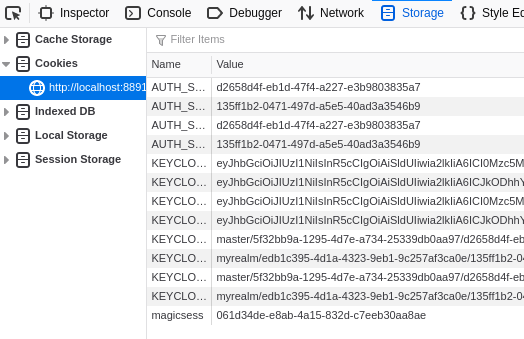
We're not done but we have the start of authentication.
How to troubleshoot an HAProxy configuration
Obviously this is a lot. What tools are available to inspect and troubleshoot all this configuration?
Running HAProxy in debug mode
As shown above, running HAProxy with -d gives us debug output and runs in the foreground.
Log customization
HAProxy logging is one line per request. This is what you expect in an HTTP log. When you need println-style debugging it's still possible but takes some extra thought:
global ... log stdout local2 frontend fe_main log global # log-format "%[var(sess.now)] %[var(sess.expiration)] ... remaining %[var(sess.now),neg,add(sess.expiration)]" # log-format "%ci:%cp [%tr] %ft %b/%s %TR/%Tw/%Tc/%Tr/%Ta %ST %B %CC %CS %tsc %ac/%fc/%bc/%sc/%rc %sq/%bq %hr %hs %{+Q}r" log-format "%ci:%cp [%tr] %ft %b/%s %TR/%Tw/%Tc/%Tr/%Ta %ST %B %CC %CS %tsc %ac/%fc/%bc/%sc/%rc %sq/%bq %hr %hs %{+Q}r %[var(sess.now),neg,add(sess.expiration)] %[var(sess.username)]" ...
By setting "log stdout" I can see the HTTP log interleaved with the foreground debug output. Note that HAProxy by design won't touch a filesystem once it has started serving traffic so there's no direct way to say "log to /var/log/haproxy.out". In production you're meant to have syslog running which can write to log files.
The commented log format line above is the default HTTP log format. The uncommented line after it shows that I've added two fields at the end which are session variables that I've set elsewhere in the haproxy.cfg.
- In this case the fields are
- "%[var(sess.now),neg,add(sess.expiration)]" - how many seconds are left before the ID token expires
- "%[var(sess.username)]" - the username from the ID token
So it's possible to put any information you want in the HTTP log entry.
erik@carbon ~ $ haproxy -d -f haproxy.cfg Note: setting global.maxconn to 262121. Available polling systems : epoll : pref=300, test result OK poll : pref=200, test result OK select : pref=150, test result FAILED Total: 3 (2 usable), will use epoll. Available filters : [BWLIM] bwlim-in [BWLIM] bwlim-out [CACHE] cache [COMP] compression [FCGI] fcgi-app [SPOE] spoe [TRACE] trace Using epoll() as the polling mechanism. 00000000:fe_main.accept(0005)=001f from [127.0.0.1:33352] ALPN=00000000:fe_main.clireq[001f:ffffffff]: GET /magic HTTP/1.1 00000000:fe_main.clihdr[001f:ffffffff]: host: localhost:8891 00000000:fe_main.clihdr[001f:ffffffff]: user-agent: Mozilla/5.0 (X11; Linux x86_64; rv:108.0) Gecko/20100101 Firefox/108.0 00000000:fe_main.clihdr[001f:ffffffff]: accept: text/html,application/xhtml+xml,application/xml;q=0.9,image/avif,image/webp,*/*;q=0.8 00000000:fe_main.clihdr[001f:ffffffff]: accept-language: en-US,en;q=0.5 00000000:fe_main.clihdr[001f:ffffffff]: accept-encoding: gzip, deflate, br 00000000:fe_main.clihdr[001f:ffffffff]: dnt: 1 00000000:fe_main.clihdr[001f:ffffffff]: cookie: magicsess=061d34de-e8ab-4a15-832d-c7eeb30aa8ae 00000000:fe_main.clihdr[001f:ffffffff]: upgrade-insecure-requests: 1 00000000:fe_main.clihdr[001f:ffffffff]: sec-fetch-dest: document 00000000:fe_main.clihdr[001f:ffffffff]: sec-fetch-mode: navigate 00000000:fe_main.clihdr[001f:ffffffff]: sec-fetch-site: cross-site 00000000:resource.clicls[001f:ffff] 00000000:resource.closed[001f:ffff] <150>Dec 25 09:26:33 haproxy[924472]: 127.0.0.1:33352 [25/Dec/2022:09:26:33.400] fe_main resource/ 0/-1/-1/-1/0 302 239 - - LR-- 1/1/0/0/0 0/0 "GET /magic HTTP/1.1" - - 00000001:fe_main.accept(0005)=001f from [127.0.0.1:33352] ALPN= 00000001:fe_main.clireq[001f:ffffffff]: GET /code?session_state=135ff1b2-0471-497d-a5e5-40ad3a3546b9&code=0f3f1d5f-a2a1-44c4-90a2-0a8fc6dbab60.135ff1b2-0471-497d-a5e5-40ad3a3546b9.c14108a4-e20e-4204-b15f-22798a0ba8d8 HTTP/1.1 00000001:fe_main.clihdr[001f:ffffffff]: host: localhost:8891 00000001:fe_main.clihdr[001f:ffffffff]: user-agent: Mozilla/5.0 (X11; Linux x86_64; rv:108.0) Gecko/20100101 Firefox/108.0 00000001:fe_main.clihdr[001f:ffffffff]: accept: text/html,application/xhtml+xml,application/xml;q=0.9,image/avif,image/webp,*/*;q=0.8 00000001:fe_main.clihdr[001f:ffffffff]: accept-language: en-US,en;q=0.5 00000001:fe_main.clihdr[001f:ffffffff]: accept-encoding: gzip, deflate, br 00000001:fe_main.clihdr[001f:ffffffff]: dnt: 1 00000001:fe_main.clihdr[001f:ffffffff]: cookie: magicsess=061d34de-e8ab-4a15-832d-c7eeb30aa8ae 00000001:fe_main.clihdr[001f:ffffffff]: upgrade-insecure-requests: 1 00000001:fe_main.clihdr[001f:ffffffff]: sec-fetch-dest: document 00000001:fe_main.clihdr[001f:ffffffff]: sec-fetch-mode: navigate 00000001:fe_main.clihdr[001f:ffffffff]: sec-fetch-site: cross-site 00000001:authcode.srvcls[001f:ffff] 00000001:authcode.srvrep[001f:ffffffff]: HTTP/1.1 302 Moved Temporarily 00000001:authcode.srvhdr[001f:ffffffff]: set-cookie: magicsess=9c18a9fb-b855-4a57-aefe-2b6be7dff962; HttpOnly 00000001:authcode.srvhdr[001f:ffffffff]: location: /magic 00000001:authcode.srvhdr[001f:ffffffff]: transfer-encoding: chunked 00000001:authcode.clicls[001f:ffff] 00000001:authcode.closed[001f:ffff] <150>Dec 25 09:26:33 haproxy[924472]: 127.0.0.1:33352 [25/Dec/2022:09:26:33.434] fe_main authcode/ 19/0/0/0/19 302 153 - - LR-- 1/1/0/0/0 0/0 "GET /code?session_state=135ff1b2-0471-497d-a5e5-40ad3a3546b9&code=0f3f1d5f-a2a1-44c4-90a2-0a8fc6dbab60.135ff1b2-0471-497d-a5e5-40ad3a3546b9.c14108a4-e20e-4204-b15f-22798a0ba8d8 HTTP/1.1" - - 00000002:LUA-SOCKET.clicls[ffff:001e] 00000002:LUA-SOCKET.srvcls[ffff:ffff] 00000002:LUA-SOCKET.closed[ffff:ffff] 00000003:fe_main.accept(0005)=001f from [127.0.0.1:33352] ALPN= 00000003:fe_main.clireq[001f:ffffffff]: GET /magic HTTP/1.1 00000003:fe_main.clihdr[001f:ffffffff]: host: localhost:8891 00000003:fe_main.clihdr[001f:ffffffff]: user-agent: Mozilla/5.0 (X11; Linux x86_64; rv:108.0) Gecko/20100101 Firefox/108.0 00000003:fe_main.clihdr[001f:ffffffff]: accept: text/html,application/xhtml+xml,application/xml;q=0.9,image/avif,image/webp,*/*;q=0.8 00000003:fe_main.clihdr[001f:ffffffff]: accept-language: en-US,en;q=0.5 00000003:fe_main.clihdr[001f:ffffffff]: accept-encoding: gzip, deflate, br 00000003:fe_main.clihdr[001f:ffffffff]: dnt: 1 00000003:fe_main.clihdr[001f:ffffffff]: cookie: magicsess=9c18a9fb-b855-4a57-aefe-2b6be7dff962 00000003:fe_main.clihdr[001f:ffffffff]: upgrade-insecure-requests: 1 00000003:fe_main.clihdr[001f:ffffffff]: sec-fetch-dest: document 00000003:fe_main.clihdr[001f:ffffffff]: sec-fetch-mode: navigate 00000003:fe_main.clihdr[001f:ffffffff]: sec-fetch-site: cross-site 00000003:resource.srvcls[001f:ffff] 00000003:resource.srvrep[001f:ffffffff]: HTTP/1.1 200 OK 00000003:resource.srvhdr[001f:ffffffff]: content-type: text/html 00000003:resource.srvhdr[001f:ffffffff]: content-length: 99 00000003:resource.clicls[001f:ffff] 00000003:resource.closed[001f:ffff] <150>Dec 25 09:26:33 haproxy[924472]: 127.0.0.1:33352 [25/Dec/2022:09:26:33.457] fe_main resource/ 0/0/0/0/0 200 170 - - LR-- 1/1/0/0/0 0/0 "GET /magic HTTP/1.1" 300 myuser
Note "300 myuser" at the end. This request is for authenticated user "myuser" and the ID token expires in 300 seconds.
Map inspection with the stats socket
We can see the contents of our maps by enabling the stats socket and sending commands to it with the socat program. This is documented above in the maps article.
global ... # good for inspecting our maps stats socket /home/erik/tmp/magic8ball/haproxy.stat mode 600 level admin stats timeout 2m
erik@carbon ~ $ socat ~/tmp/magic8ball/haproxy.stat readline prompt > show map # id (file) description 2 (/home/erik/tmp/magic8ball/idtoken.map) pattern loaded from file '/home/erik/tmp/magic8ball/idtoken.map' used by map at file 'haproxy.cfg' line 45, by map at file 'haproxy.cfg' line 50, by map at file 'haproxy.cfg' line 60, by map at file 'haproxy.cfg' line 61, by map at file 'haproxy.cfg' line 78. curr_ver=0 next_ver=0 entry_cnt=1 5 (/home/erik/tmp/magic8ball/accesstoken.map) pattern loaded from file '/home/erik/tmp/magic8ball/accesstoken.map' used by map at file 'haproxy.cfg' line 76. curr_ver=0 next_ver=0 entry_cnt=1 6 (/home/erik/tmp/magic8ball/refreshtoken.map) pattern loaded from file '/home/erik/tmp/magic8ball/refreshtoken.map' used by map at file 'haproxy.cfg' line 77. curr_ver=0 next_ver=0 entry_cnt=1 > show map #2 0x5602fadc7270 9c18a9fb-b855-4a57-aefe-2b6be7dff962 eyJhbGciOiJSUzI1NiIsInR5cCIgOiAiSldUIiwia2lkIiA6ICJoaHpkV29CWGpDSlVEcjJrOV9INkxGV2p1MEVIVVphUXZya3FFcGdSNWxFIn0.eyJleHAiOjE2NzE5ODU4OTMsImlhdCI6MTY3MTk4NTU5MywiYXV0aF90aW1lIjoxNjcxOTgzMTc2LCJqdGkiOiI1Zjg5MmY4Yy0zNDZhLTRjN2UtYjkyOC1lZDE3NGMzMWM4NTUiLCJpc3MiOiJodHRwOi8vbG9jYWxob3N0OjgwODAvcmVhbG1zL215cmVhbG0iLCJhdWQiOiJtYWdpYzhiYWxsIiwic3ViIjoiZWRiMWMzOTUtNGQxYS00MzIzLTllYjEtOWMyNTdhZjNjYTBlIiwidHlwIjoiSUQiLCJhenAiOiJtYWdpYzhiYWxsIiwic2Vzc2lvbl9zdGF0ZSI6IjEzNWZmMWIyLTA0NzEtNDk3ZC1hNWU1LTQwYWQzYTM1NDZiOSIsImF0X2hhc2giOiJRWXBIaEJaMVNjcER3a1JyWEVIT2tBIiwiYWNyIjoiMCIsInNpZCI6IjEzNWZmMWIyLTA0NzEtNDk3ZC1hNWU1LTQwYWQzYTM1NDZiOSIsImVtYWlsX3ZlcmlmaWVkIjpmYWxzZSwibmFtZSI6Ik15IFVzZXIiLCJwcmVmZXJyZWRfdXNlcm5hbWUiOiJteXVzZXIiLCJnaXZlbl9uYW1lIjoiTXkiLCJmYW1pbHlfbmFtZSI6IlVzZXIifQ.EcMYJNBiyRSxneOHapDhbwFm1pmW_7I6c96Gg9gjRnbsni3-OJTmsO3fgxTpvxn_S1GQhzy8pixyvXnoNLCHy2YSKJEqq9QQUmNZPoLWc6sIZiHceo5c7qAjGMcuWKJIjmE-ttfyTlV_ikda3TINo_wMgi8GDVph47q-_Vy_SmQe-E9KtfXnw2lkZSfhiCXOnU6JsFqDesnhUWPYnq2IbXNkXAfUwRMPdUdbfafN3nvQupDTI1MJSPeUWOM2WVBr6NwRgD2gTWJrSaR7B8MeikB2X-ULM2tDquo4dGcxAz7Tor4uP6O32l3awQQqu9sOg0D7ONPPcL9eGZ4UstvaDg >
Debug statements in Lua
The "core.Debug()" and "core.Alert()" statements in our Lua scripts give us println-style debugging when we're running HAProxy with the -d flag (but not in a production configuration).
Validate the received tokens
Our authentication seems to work but isn't secure yet. A user could set any random UUID as their session cookie and gain access to the application. We must now validate the tokens.
When we fetch the tokens we'll verify the signature, issuer and audience before storing them in our map.
On every request we'll verify that the ID token exists and isn't expired.
Verifying the token signature is done with asymmetric cryptography. We configure the public key beforehand then use it to verify the signature part of the JWT.
For this HAProxy requires having the PEM-encoded keys (JWKS). Keycloak provides a per-realm JSON blob with the keys at http://localhost:8080/realms/myrealm/protocol/openid-connect/certs. There are two not-PEM-encoded keys given so we manually PEM-encode them and configure them at key0.pem and key1.pem and expect the token to be signed by one of them.
Converting the keys from JWKS to PEM was awkward and ultimately I just used this online converter.
Here's the token-fetch-time validation of the signature, issuer and audience. We validate the signature of the access token too though technically we're not the consumer (audience) of the access token so it's not our problem to validate that.
backend authcode ... # validate token signature - access token http-request set-var(req.accesstoken) var(req.tokenresponse),json_query('$.access_token') http-request set-var(req.jwt_alg) var(req.accesstoken),jwt_header_query('$.alg') acl jwt_sig_rs256 var(req.jwt_alg) -m str -i "RS256" http-request deny if !jwt_sig_rs256 acl key0_valid var(req.accesstoken),jwt_verify(req.jwt_alg,"/home/erik/tmp/magic8ball/key0.pem") 1 acl key1_valid var(req.accesstoken),jwt_verify(req.jwt_alg,"/home/erik/tmp/magic8ball/key1.pem") 1 http-request deny if !key0_valid !key1_valid # don't validate token signature - refresh token - note it's HS256 and doesn't validate with PEM files? http-request set-var(req.refreshtoken) var(req.tokenresponse),json_query('$.refresh_token') # validate token signature - id token http-request set-var(req.idtoken) var(req.tokenresponse),json_query('$.id_token') http-request set-var(req.jwt_alg) var(req.idtoken),jwt_header_query('$.alg') acl jwt_sig_rs256 var(req.jwt_alg) -m str -i "RS256" http-request deny if !jwt_sig_rs256 acl key0_valid var(req.idtoken),jwt_verify(req.jwt_alg,"/home/erik/tmp/magic8ball/key0.pem") 1 acl key1_valid var(req.idtoken),jwt_verify(req.jwt_alg,"/home/erik/tmp/magic8ball/key1.pem") 1 http-request deny if !key0_valid !key1_valid # validate id token issuer acl id_token_issuer_valid var(req.idtoken),jwt_payload_query('$.iss') -m str "http://localhost:8080/realms/myrealm" http-request deny if !id_token_issuer_valid # validate id token audience - should be our client ID acl id_token_audience_valid var(req.idtoken),jwt_payload_query('$.aud') -m str "magic8ball" http-request deny if !id_token_audience_valid ...
Here's the validation done every request to our protected resource. We expect the ID token to exist in our map and to not be expired. If those things don't all validate we redirect to fetch new tokens (as before), possibly prompting the user to log in again.
backend resource # get tokens if no cookie acl has_cookie req.cook(magicsess) -m found # get tokens if cookie doesn't map to an id token acl cookie_has_id_token req.cook(magicsess),map(/home/erik/tmp/magic8ball/idtoken.map) -m found # get tokens if id token is expired # (eventually http-request lua.magicrefresh if invalid exp) http-request set-var(sess.now) date http-request set-var(sess.expiration) req.cook(magicsess),map(/home/erik/tmp/magic8ball/idtoken.map),jwt_payload_query('$.exp','int') acl id_token_not_expired var(sess.now),neg,add(sess.expiration) gt 0 # get tokens http-request redirect location 'http://localhost:8080/realms/myrealm/protocol/openid-connect/auth?scope=openid&response_type=code&client_id=magic8ball&redirect_uri=http://localhost:8891/code' unless has_cookie cookie_has_id_token id_token_not_expired
We have now secured our application.
Use profile information in the application
We're now free to pass information from the ID token to the application if we want, though this isn't required. Here we set variables sess.name and sess.username which our magic8ball service can render.
backend resource ... # TODO: retool /code to also use refresh token to get new tokens # want to pass headers X-Authenticated-User and X-Name for use in the application # but a Lua service doesn't get them. Using variables instead http-request set-var(sess.username) req.cook(magicsess),map(/home/erik/tmp/magic8ball/idtoken.map),jwt_payload_query('$.preferred_username') http-request set-var(sess.name) req.cook(magicsess),map(/home/erik/tmp/magic8ball/idtoken.map),jwt_payload_query('$.name') # pass legit traffic to application http-request use-service lua.magic8ball
local function magic8ball(applet) -- If client is POSTing request, receive body -- local request = applet:receive() local responses = {"Reply hazy", "Yes - definitely", "Don't count on it", "Outlook good", "Very doubtful"} local myrandom = math.random(1, #responses) local response = string.format([[ <html> <body> <div>%s</div> <div>For you, %s</div> </body> </html> ]], responses[myrandom], applet.get_var(applet,"sess.name")) applet:set_status(200) applet:add_header("content-length", string.len(response)) applet:add_header("content-type", "text/html") applet:start_response() applet:send(response) end core.register_service("magic8ball", "http", magic8ball)

The complete implementation
Here's the complete implementation.
haproxy.cfg:
global # action: exchange an authcode for tokens lua-load magictokens.lua # service: redirect back to the application while setting a cookie in a way that redirect can't do lua-load magicsetcookie.lua # service: the target application lua-load magic8ball.lua # good for inspecting our maps stats socket /home/erik/tmp/magic8ball/haproxy.stat mode 600 level admin stats timeout 2m log stdout local2 defaults mode http timeout connect 10s timeout client 1m timeout server 1m frontend fe_main log global # log-format "%[var(sess.now)] %[var(sess.expiration)] ... remaining %[var(sess.now),neg,add(sess.expiration)]" # log-format "%ci:%cp [%tr] %ft %b/%s %TR/%Tw/%Tc/%Tr/%Ta %ST %B %CC %CS %tsc %ac/%fc/%bc/%sc/%rc %sq/%bq %hr %hs %{+Q}r" log-format "%ci:%cp [%tr] %ft %b/%s %TR/%Tw/%Tc/%Tr/%Ta %ST %B %CC %CS %tsc %ac/%fc/%bc/%sc/%rc %sq/%bq %hr %hs %{+Q}r %[var(sess.now),neg,add(sess.expiration)] %[var(sess.username)]" bind :8891 # /code will fetch tokens from an authcode use_backend authcode if { path == /code } # regular resource default_backend resource backend resource # get tokens if no cookie acl has_cookie req.cook(magicsess) -m found # get tokens if cookie doesn't map to an id token acl cookie_has_id_token req.cook(magicsess),map(/home/erik/tmp/magic8ball/idtoken.map) -m found # get tokens if id token is expired # (eventually http-request lua.magicrefresh if invalid exp) http-request set-var(sess.now) date http-request set-var(sess.expiration) req.cook(magicsess),map(/home/erik/tmp/magic8ball/idtoken.map),jwt_payload_query('$.exp','int') acl id_token_not_expired var(sess.now),neg,add(sess.expiration) gt 0 # get tokens http-request redirect location 'http://localhost:8080/realms/myrealm/protocol/openid-connect/auth?scope=openid&response_type=code&client_id=magic8ball&redirect_uri=http://localhost:8891/code' unless has_cookie cookie_has_id_token id_token_not_expired # TODO: retool /code to also use refresh token to get new tokens # want to pass headers X-Authenticated-User and X-Name for use in the application # but a Lua service doesn't get them. Using variables instead http-request set-var(sess.username) req.cook(magicsess),map(/home/erik/tmp/magic8ball/idtoken.map),jwt_payload_query('$.preferred_username') http-request set-var(sess.name) req.cook(magicsess),map(/home/erik/tmp/magic8ball/idtoken.map),jwt_payload_query('$.name') # pass legit traffic to application http-request use-service lua.magic8ball backend authcode # use this lua action to fetch access/id/refresh tokens with the auth code http-request set-var(req.authcode) url_param(code) http-request lua.magictokens # Generate a random (type 4) UUID as a session key. This is the key in the maps http-request set-var(req.sessioncookie) uuid # This noise is required for our maps to be visible # https://github.com/haproxy/haproxy/issues/1156 ... not fixed http-request set-header Foo %[path,map(/home/erik/tmp/magic8ball/accesstoken.map)] http-request set-header Foo %[path,map(/home/erik/tmp/magic8ball/refreshtoken.map)] http-request set-header Foo %[path,map(/home/erik/tmp/magic8ball/idtoken.map)] http-request del-header Foo # validate token signature - access token http-request set-var(req.accesstoken) var(req.tokenresponse),json_query('$.access_token') http-request set-var(req.jwt_alg) var(req.accesstoken),jwt_header_query('$.alg') acl jwt_sig_rs256 var(req.jwt_alg) -m str -i "RS256" http-request deny if !jwt_sig_rs256 acl key0_valid var(req.accesstoken),jwt_verify(req.jwt_alg,"/home/erik/tmp/magic8ball/key0.pem") 1 acl key1_valid var(req.accesstoken),jwt_verify(req.jwt_alg,"/home/erik/tmp/magic8ball/key1.pem") 1 http-request deny if !key0_valid !key1_valid # don't validate token signature - refresh token - note it's HS256 and doesn't validate with PEM files? http-request set-var(req.refreshtoken) var(req.tokenresponse),json_query('$.refresh_token') # validate token signature - id token http-request set-var(req.idtoken) var(req.tokenresponse),json_query('$.id_token') http-request set-var(req.jwt_alg) var(req.idtoken),jwt_header_query('$.alg') acl jwt_sig_rs256 var(req.jwt_alg) -m str -i "RS256" http-request deny if !jwt_sig_rs256 acl key0_valid var(req.idtoken),jwt_verify(req.jwt_alg,"/home/erik/tmp/magic8ball/key0.pem") 1 acl key1_valid var(req.idtoken),jwt_verify(req.jwt_alg,"/home/erik/tmp/magic8ball/key1.pem") 1 http-request deny if !key0_valid !key1_valid # validate id token issuer acl id_token_issuer_valid var(req.idtoken),jwt_payload_query('$.iss') -m str "http://localhost:8080/realms/myrealm" http-request deny if !id_token_issuer_valid # validate id token audience - should be our client ID acl id_token_audience_valid var(req.idtoken),jwt_payload_query('$.aud') -m str "magic8ball" http-request deny if !id_token_audience_valid # store the fetched tokens in our maps with session ID as key http-request set-map(/home/erik/tmp/magic8ball/accesstoken.map) %[var(req.sessioncookie)] %[var(req.accesstoken)] http-request set-map(/home/erik/tmp/magic8ball/refreshtoken.map) %[var(req.sessioncookie)] %[var(req.refreshtoken)] http-request set-map(/home/erik/tmp/magic8ball/idtoken.map) %[var(req.sessioncookie)] %[var(req.idtoken)] # Send the user back to /magic, setting the new session cookie http-request use-service lua.magicsetcookie
magic8ball.lua
local function magic8ball(applet) -- If client is POSTing request, receive body -- local request = applet:receive() local responses = {"Reply hazy", "Yes - definitely", "Don't count on it", "Outlook good", "Very doubtful"} local myrandom = math.random(1, #responses) local response = string.format([[ <html> <body> <div>%s</div> <div>For you, %s</div> </body> </html> ]], responses[myrandom], applet.get_var(applet,"sess.name")) applet:set_status(200) applet:add_header("content-length", string.len(response)) applet:add_header("content-type", "text/html") applet:start_response() applet:send(response) end core.register_service("magic8ball", "http", magic8ball)
magicsetcookie.lua
local function magicsetcookie(applet) applet:set_status(302) -- set cookie cookie = applet.get_var(applet,'req.sessioncookie') --core.Debug(cookie) applet:add_header("Set-Cookie", string.format("magicsess=%s; HttpOnly",cookie)) applet:add_header("Location", "/magic") applet:start_response() end core.register_service("magicsetcookie", "http", magicsetcookie)
magictokens.lua
local function magictokens(txn) ------------------------------- -- Get the auth code variable ------------------------------- authcode = txn.get_var(txn,"req.authcode") --core.Debug(string."auth code is authcode") ------------------------------- -- Prepare token request ------------------------------- -- http://localhost:8080/realms/myrealm/protocol/openid-connect/token client_id_and_secret = "bWFnaWM4YmFsbDprU01tYndHOGoxRlVCeG5UZ0FKd1JkdEUwcjBjcnR5Sw==" realm = "myrealm" token_endpoint = string.format("/realms/%s/protocol/openid-connect/token",realm) client_id="magic8ball" grant_type="authorization_code" redirect_uri="http://localhost:8891/code" data=string.format("grant_type=%s&client_id=%s&redirect_uri=%s&code=%s",grant_type,client_id,redirect_uri,authcode) auth_header = string.format("Authorization: Basic %s",client_id_and_secret) content_length_header = string.format("Content-Length: %d", string.len(data)) content_type_header = "Content-Type: application/x-www-form-urlencoded" token_request = string.format("POST %s HTTP/1.1\r\n%s\r\n%s\r\n%s\r\n\r\n%s",token_endpoint,auth_header,content_type_header,content_length_header,data) --core.Debug(string."request is token_request") ------------------------------- -- Make request over TCP ------------------------------- contentlen = 0 idp = core.tcp() idp:settimeout(5) -- connect to issuer if idp:connect('127.0.0.1','8080') then if idp:send(token_request) then -- Skip response headers while true do local line, err = idp:receive('*l') if err then core.Alert(string.format("error reading header: %s",err)) break else if line then --core.Debug(string."data: line") if line == '' then break end -- core.Debug(string."substr: string.sub(line,1,3)") if string.sub(string.lower(line),1,15) == 'content-length:' then --core.Debug(string."found content-length: string.sub(line,16)") contentlen = tonumber(string.sub(line,16)) end else --core.Debug("no more data") break end end end -- Get response body, if any --core.Debug("read body") local content, err = idp:receive(contentlen) if content then -- save the entire token response out to a variable for -- further processing in haproxy.cfg --core.Debug(string."tokens are content") txn.set_var(txn,'req.tokenresponse',content) else core.Alert(string.format("error receiving tokens: %s",err)) end else core.Alert('Could not send to IdP (send)') end idp:close() else core.Alert('Could not connect to IdP (connect)') end end core.register_action("magictokens",{'http-req'}, magictokens, 0)
How could this implementation be improved?
While secure and useful, there are more steps to make this production-ready and maintainable.
TLS
... in production, obviously, for both Keycloak and HAProxy.
Use Lua HTTP Client class
As noted above, there's an easier way to do HTTP from the Lua action.
Use the refresh token
When the ID token expires the user is redirected back to Keycloak and may have to log in again. We can instead use the refresh token on the server side to fetch new tokens. I'd modify the magictokens action to support this case too. This would provide the user a less-disruptive experience.
Add authorization
We have implemented authentication in a way that any realm user can access the application. What if we want to require that users have a certain role or are in a certain group to interact with certain resources. For this Keycloak provides the access token which has a list of permissions that. Enabling authorization is another whole thing but is totally possible. In that case we'd expose those permissions from the access token to the application to base authorization decisions.
Socket task: periodically dump tokens to map files
If HAProxy is reloaded or restarted, the in-memory contents of the maps are lost. As hinted above, a cronjob can periodically dump the map contents to the map files using the socket (socat).
Socket task: periodically remove expired tokens
Over time many session UUID's are created and put into the maps, growing unbounded. A cronjob, again using the socket (socat), can sweep the map and delete entries with expired tokens so the data remains lean.
Periodically download JWKS keys
We manually downloaded the JWKS keys and converted them to PEM format. Of course those keys expire eventually. A cronjob can download them periodically, convert to PEM, and reload the HAProxy process when they've changed.
Conclusion
I've shown how an auth-unaware web application can be made to require authentication using Keycloak and HAProxy alone.
I'd be lying if I said I whipped that out in a couple hours. It was a lot of hours, enough that it was worth documenting in a blog post.
Still, I'd absolutely reach for this solution in a case where some first- or third-party application needs to be made to authenticate with an organization's standard OIDC solution (in this case Keycloak).
I want to also show off how powerful those two technologies are.
I hope you found this interesting and maybe useful.